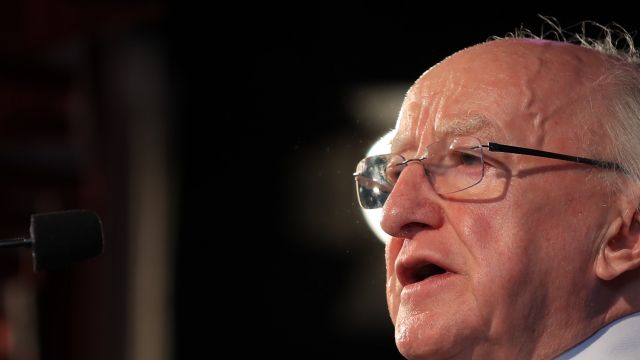More than 50 homes and businesses were burned in the north Co Dublin town and two men killed on September 20th, 1920 following the killing of two Royal Irish Constabulary (RIC) officers.
On the centenary of the night of chaos, Mr Higgins said the ferocity of events were aimed to “instil fear” but instead galvanised support for the struggle which ultimately led to the establishment of the Irish Free State in 1921.
The past and present join together today in Balbriggan on this day 20th of September 1920 the town became the site for a night of terror that made global history @BalbrigganHist @Fingalcoco @SubsetDublin continue at this site today on a mural to mark the Sack of Balbriggan❤ pic.twitter.com/BlewEjp4ZG
— Fingal Arts (@fingalarts) September 20, 2020
Mr Higgins had been due to attend centenary events in Balbriggan on Sunday but these were scaled back due to the coronavirus pandemic.
The President instead released his thoughts in a statement.
“Today, as we remember the bloody violence that occurred in Balbriggan exactly a century ago, violence that would result in tragedy, widespread suffering, and lingering bitterness, we must strive to do so ethically and responsibly,” he said.
“Such an ethical remembering must refuse any kind of conscious or unconscious amnesia.
“The exercise in remembering must be open to all perspectives, requires us all, each of us, to summon up our shared humanity, a humanity which was tested, often brutalised, but also magnified during the War of Independence and indeed over the longer revolutionary period.”
Mr Higgins said to forgive “is not to forget”.
“Forgiving enables us to come to terms with the past,” he said.
“If forgiveness and forgetting did not exist, we would be trapped in the past where every previous action would be irrevocable and where the present is dominated, burdened even, by preceding events and memories.
“Recognition of the act committed, however, is essential.
“It is only through such forms of ethical remembering that we can avoid retreating to the blinding categories of censure or denunciation, or indeed revenge and bitterness, that blighted this island for so long.
“Let us all continue with, indeed embrace, the new beginning that the Belfast (Good Friday) Agreement represented as we continue to carve out our peaceful co-existence on the island of Ireland through a genuine democratic dialogue grounded in respect for our communities’ identities and their lawful traditions, recognising and paying tribute to John Hume’s vision of a shared island at peace.”







